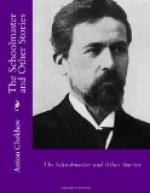With tears in his eyes, trembling all over, Abogin opened his heart to the doctor with perfect sincerity. He spoke warmly, pressing both hands on his heart, exposing the secrets of his private life without the faintest hesitation, and even seemed to be glad that at last these secrets were no longer pent up in his breast. If he had talked in this way for an hour or two, and opened his heart, he would undoubtedly have felt better. Who knows, if the doctor had listened to him and had sympathized with him like a friend, he might perhaps, as often happens, have reconciled himself to his trouble without protest, without doing anything needless and absurd. . . . But what happened was quite different. While Abogin was speaking the outraged doctor perceptibly changed. The indifference and wonder on his face gradually gave way to an expression of bitter resentment, indignation, and anger. The features of his face became even harsher, coarser, and more unpleasant. When Abogin held out before his eyes the photograph of a young woman with a handsome face as cold and expressionless as a nun’s and asked him whether, looking at that face, one could conceive that it was capable of duplicity, the doctor suddenly flew out, and with flashing eyes said, rudely rapping out each word:
“What are you telling me all this for? I have no desire to hear it! I have no desire to!” he shouted and brought his fist down on the table. “I don’t want your vulgar secrets! Damnation take them! Don’t dare to tell me of such vulgar doings! Do you consider that I have not been insulted enough already? That I am a flunkey whom you can insult without restraint? Is that it?”
Abogin staggered back from Kirilov and stared at him in amazement.
“Why did you bring me here?” the doctor went on, his beard quivering. “If you are so puffed up with good living that you go and get married and then act a farce like this, how do I come in? What have I to do with your love affairs? Leave me in peace! Go on squeezing money out of the poor in your gentlemanly way. Make a display of humane ideas, play (the doctor looked sideways at the violoncello case) play the bassoon and the trombone, grow as fat as capons, but don’t dare to insult personal dignity! If you cannot respect it, you might at least spare it your attention!”
“Excuse me, what does all this mean?” Abogin asked, flushing red.
“It means that it’s base and low to play with people like this! I am a doctor; you look upon doctors and people generally who work and don’t stink of perfume and prostitution as your menials and mauvais ton; well, you may look upon them so, but no one has given you the right to treat a man who is suffering as a stage property!”
“How dare you say that to me!” Abogin said quietly, and his face began working again, and this time unmistakably from anger.
“No, how dared you, knowing of my sorrow, bring me here to listen to these vulgarities!” shouted the doctor, and he again banged on the table with his fist. “Who has given you the right to make a mockery of another man’s sorrow?”




